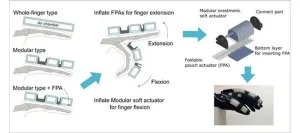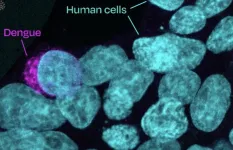(Press-News.org) A University of Virginia School of Medicine scientist and other top experts from around the world have developed the first comprehensive guidelines for reporting cutting-edge “precision medicine” research in a bid to improve patient care and health equity for people everywhere.
Precision medicine aims to tailor treatments to individual patients to get the best possible outcomes. It does this by considering many different factors specific to the patient, such as the patient’s genetics, environment, lifestyle and more. But until now there have been no standardized guidelines for reporting precision medicine research, hindering progress.
The inaugural reporting guidelines have been published in the leading clinical medicine journal, Nature Medicine. The paper from the BePRECISE (Better Precision-data Reporting of Evidence from Clinical Intervention Studies & Epidemiology) consortium details comprehensive guidelines aimed at improving the accuracy, safety and health equity in precision medicine.
One of the key architects of the plan was UVA’s Stephen S. Rich, PhD, of the Department of Public Health Sciences and the Center for Public Health Genomics.
“Precision medicine is becoming reality in both research and in clinical practice, yet there have not been guidelines on how research in precision medicine is reported. Without standards of reporting, it is difficult to determine the quality of the evidence from research and whether it really is fundamentally sound and ready for translation into the clinic,” Rich said. “Ultimately, our work in BePRECISE can be used by the editors of medical journals and reviewers of research papers to guide the evaluation of submitted research and whether the key information is provided to clinical investigators reading the research and determining whether the work can improve the health of people through application of precision medicine approaches.”
More Precise Precision Medicine
The BePRECISE consortium included 23 global experts in precision medicine, cardiometabolic diseases, statistics, editorial and lived experience. The researchers created the new guidelines after conducting a sweeping review of the existing precision medicine research and identifying ways to improve how that research is reported.
Guidelines committee Chair Paul Franks, PhD, from Sweden’s Lund University, noted the challenges that precision medicine has faced: “Precision medicine seeks to tailor healthcare to individual characteristics, accounting for the heterogeneous nature of diseases such as diabetes, cardiovascular disease, cancers, mental health disorders, musculoskeletal disorders and infectious diseases,” he said. “However, this heterogeneity, combined with varied research methodologies, has created challenges in comparing studies and implementing findings across the field.”
The new BePRECISE Checklist includes 23 items organized into five sections corresponding to typical sections of a scientific publication. A dedicated section on health equity emphasizes the importance of including underrepresented and underserved communities in precision medicine research, as well as patient and public involvement and engagement. “We believe that precision medicine research should place emphasis on the development of solutions for people in greatest need, regardless of who or where they are,” the authors write.
Practical Recommendations
The checklist offers practical recommendations that researchers can implement immediately. For example, the BePRECISE consortium members found that only 17% of the papers they reviewed included “precision medicine” in the paper’s title or in the abstract summarizing the work. That simple addition could make it much easier for doctors and researchers to find relevant information on the latest precision medicine findings.
Other recommendations include:
Using appropriate population descriptors such as ancestry, geographic and sociodemographic characteristics of all study participants, particularly those in underrepresented groups;
describing aspects of the study design relevant to precision medicine;
reporting statistical tests and results for subgroup comparisons; and
describing the precision medicine approach that could potentially be applied in clinical practice.
The BePRECISE consortium is encouraging adoption of the new guidelines by researchers, reviewers, funders and editors to promote and expedite the equitable clinical implementation of precision medicine. The checklist is expected to enhance the quality and comparability of precision medicine studies, fostering advancements in healthcare for all.
“Ultimately, precision medicine promises to provide the most appropriate ways to prevent, diagnose, treat and predict outcomes of a disease process with cost-effective measures,” Rich said. “These approaches need to be available and applicable to all people of need globally.”
For more information about the BePRECISE guidelines and to access the checklist, visit www.be-precise.org.
To keep up with the latest medical research news from UVA, subscribe to the Making of Medicine blog at http://makingofmedicine.virginia.edu.
END
Research Highlights:
Two new, basic research studies in rodents (mice and rats) analyzed the impacts that alcohol may have on the heart.
In a mouse study, abnormal heart rhythms that can occur after a pattern of repeated simulation of binge drinking may be related to a spike in a stress protein found in the heart. Researchers tested a heart protective molecule to reduce the stress protein spike and the resulting irregular heart rhythms.
In a study using rats that lacked estrogen production to simulate human menopause, alcohol exposure resulted ...
A technology has been developed to decompose refrigerants, a greenhouse gas 1,300 times more potent than carbon dioxide, using challenging-to-handle industrial waste.
Dr. Ryi, Shin-kun’s research team at the Hydrogen Convergence Materials Lab of the Korea Institute of Energy Research (KIER) has successfully developed a catalyst from industrial waste known as 'red mud,' a byproduct of aluminum production. This catalyst can decompose HFC-134a refrigerant, commonly used in household appliances like air conditioners and refrigerators, with an efficiency of 99%.
* Red Mud: An industrial byproduct remaining after extracting aluminum ...
Tim Rademacher is taking on a sweet new role at the University of Vermont—as the new Scientific Director of UVM’s Proctor Maple Research Center (PMRC). The PMRC is a field research station of the Department of Plant Biology at the University of Vermont, and is the oldest and most renowned maple science research centers in the world. Since 1947 it has produced cutting edge research on maple, supported maple sugar producers, and bolstered maple syrup production in Vermont—and globally.
“I'm very excited to join PMRC with its rich history and its excellent work that has really pushed the industry in the past, says Rademacher, who will start this fall. “I ...
Soft rehabilitation gloves have become popular tools for helping patients with hand function-related disabilities recover finger movement. These gloves often use soft pneumatic actuators that employ air pressure to generate movements. Despite significant design improvements in recent years, many available soft actuators have drawbacks in achieving bidirectional motion typical of finger joints—such soft actuators facilitate finger bending (or flexion) but not finger straightening (or extension).
A group of biomedical researchers from Chiba University successfully ...
The bull elephants gather in the evening coolness to drink. After a spell, a senior male lifts his head and turns from the waterhole. With ears flapping gently, he lets out a deep, resonant rumble.
One by one, the others respond, their voices overlapping in a sonorous, infrasonic chorus that whispers across the savanna. This elephant barbershop quartet conveys a clear message: It’s time to move on.
Gradually, the elephants shift, their massive bodies swaying as they follow their rumbling leader to the next stop on their nocturnal wanderings.
For the first time, scientists from Stanford University and other institutions have documented male elephants using “let’s ...
Submarine canyons are crucial for the instability of the Antarctic ice sheet
Antarctic canyons play a crucial role in the instability of the East Antarctic Ice Sheet, as they facilitate the transfer of relatively warm water (Circumpolar Deep Water) from the abyssal areas to the continental shelf and from there to the base of the ice sheet, thus contributing to its melting.
The new study, conducted by an international team of researchers led by the National Institute of Oceanography and Applied Geophysics (OGS) and including the University of Southampton, ...
Research Highlights:
Adults in their 50s with peripheral artery disease or PAD — are more likely than adults older than 80 to undergo leg amputation one to five years after an emergency surgery to restore blood flow to the lower limbs.
This study analyzes outcomes among patients older than age 50 hospitalized with PAD, as noted in eight years of data collected in England.
Researchers say early diagnosis, risk factor modification and treatment are warranted to help prevent patients from developing severe forms of PAD.
Embargoed until 4 a.m. CT/5 a.m. ET Monday, July 22, 2024
DALLAS, ...
KANSAS CITY, MO—July 22, 2024—Mosquito-borne viral infections once confined to tropical regions are spreading. Dengue virus infects up to 400 million people worldwide each year according to World Health Organization estimates, and no available treatments exist for this disease. Now, research from the Stowers Institute for Medical Research has uncovered surprising strategies for how dengue and hundreds of other viruses replicate in their hosts, with the potential to aid in developing novel antiviral treatments and vaccines.
Led by Stowers Predoctoral Researcher Luciana ...
Peer reviewed: Yes
Type of evidence: Observational study
Subject: Animals
UNDER STRICT EMBARGO until 10:00 hours [UK BST] / 05:00 hours [US EDT] Monday 22 July 2024
Smell of human stress affects dogs’ emotions leading them to make more pessimistic choices
Dogs experience emotional contagion from the smell of human stress, leading them to make more ‘pessimistic’ choices, new research finds. The University of Bristol-led study, published in Scientific Reports today [22 July], is the first to test how human stress odours affect dogs' learning and emotional state.
Evidence in humans suggests that the smell of a stressed ...
Research on thousands of proteins measured from a drop of blood demonstrates the ability of proteins to predict the onset of many diverse diseases.
The research, published today (22 July 2024) in Nature Medicine, was carried out as part of an international research partnership between GSK, Queen Mary University of London, University College London, Cambridge University and the Berlin Institute of Health at Charité Universitätsmedizin, Germany.
The researchers used data from the UK Biobank Pharma Proteomics Project (UKB-PPP), ...






